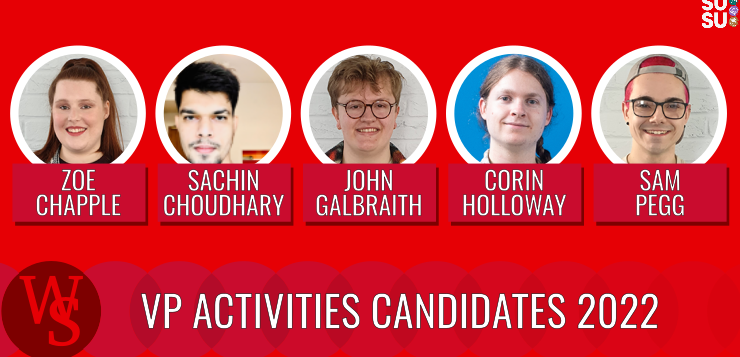- Interview with Zoe Chapple: VP Activities Candidate
- Interview with Rishi-Nayan Varodaria: Union President Candidate
- Interview with Parth Pandya: VP Education and Democracy Candidate
- Interview with Samuel Pegg: VP Activities Candidate
- Interview with Oliver Murray: Union President Candidate
- Interview with Xiao ‘Veronica’ Wang: VP Education and Democracy Candidate
- Interview with Benedict Madan: Union President Candidate
- RUMOUR HAS IT… 2022 UNION ELECTIONS RUMOURED SABBATICAL OFFICER CANDIDATES
- Interview with Jamie Biltcliffe: VP Education and Democracy Candidate
- Interview with Holly Denton: VP Education and Democracy Candidate
- Interview with Emily Bastable: VP Education and Democracy Candidate
- Spring Elections 2022 Candidates Revealed
- There’s still time to nominate yourself for a SUSU leadership role
- Interview with Harry Bull: Union President Candidate
- Interview with Ryan Couchman-Sawyer: VP Education and Democracy Candidate
- Interview with Selin Moustafa: VP Welfare and Community Candidate
- Interview with Ruby Turner: VP Welfare and Community Candidate
- Interview with Aycha Ates-Di Adamo: VP Welfare and Community Candidate
- Interview with VP Sports Candidate: Casie Osbourne
- Interview with Corin Holloway: VP Activities Candidate
- SUSU Spring Elections 2022 Liveblog
Wessex Scene were able to interview Samuel Pegg about their campaign to be the next VP Activities.
Sam elected to answer these questions during an interview.
Why did you apply for the role of VP Activities?
I’m involved in a lot of societies. I love societies and I think there are a lot of things that don’t necessarily need improving, but can be made easier for societies so that engagement can be increased. I just want to let societies see their own potential because I think that, if you’re affiliated or even if you’re thinking about affiliation, they deserve care and nurturing to be the best they can be, and that’s something I’m really keen to provide.
I think that’s what VP Activities needs, someone who has enthusiasm for the role, and being the editor of The Edge must help with that.
Definitely. Being the editor has put me in an interesting spot, where currently the society’s running quite well. We’ve got magazines coming out, almost a full committee, but there are those lurking questions about next year. Most of our committee members are third years and most of our writers are third years, and it’s a situation that I know a lot of societies are in. I think whoever takes the VP Activities role next year needs to be aware of that situation and be planning how to keep these societies running, even in the event that they may not have a full committee. I think where my love and interests fall with The Edge, and my desire to keep it running, comes in. I’m creating contingency plans and I think it’s something that I can map onto other societies to help them if needs be.
In relation to this, one of your policies that stuck out for me was the emergency fund. What would make the best emergency financial system?
Obviously, it needs money. I don’t want to necessarily take it from grant rounds, because I know the VP Activities gets a certain amount of money that they have to dish it out fairly how they see fit. I don’t want to take that from grant rounds because then that’s immediately affecting societies. I think it’s about securing money separately from the grant rounds to put in a pot to the side, and the idea is that it will still have a formal application process but it wouldn’t be intense. As VP Activities I would sit with someone, talk them through the stages and say “let’s think about this,” “why are you applying for the money?” “Does it fit?” The way I look at it, it needs to be there to save societies from financially going under or helping them continue. For example, if membership is really low and the society is struggling to fill the major roles of a committee, this emergency fund might be something that allows them to run a dual event with another society that has loads of members and a similar interest, but originally it may not have been able to run without funding. This emergency pot can come in and try to help them, try to get them back on their feet, and try to get them the committee they need so they can pull in the members they need. It’s about keeping all the lovely societies that we have running, and not adding stress. University is a stressful time already, running a committee is stressful, and you add money problems on top of that, it creates issues and I don’t want that to be the case. I want societies to be as smooth sailing as they can be.
Student media groups like The Edge or Wessex Scene are lucky in that we an amount of money set aside every year that’s not touched. But for regular societies, there’s this constant fear of waking up one day and not having anything left.
It’s the issue we’ve had with TG [Theatre Group.] We’ve lost so much money because of cancelled shows during Covid. SUSU look at our finances, see that we make our own money and offer us no help, and it’s been crippling. We haven’t been able to run for the past two years because of it and yes, we can apply for grants, but the grant rounds aren’t often enough. When we needed the money most there wasn’t a grant round and so we had no support.
You mention PA [Performing Arts] societies in your manifesto as well, and I think one of your policies was to increases visibility for PA societies, especially TG and StageSoc. I think that’s something that is extremely important and is attracting a lot of people towards you. How do you plan on increasing visibility as VP Activities?
So, I think the first thing is encouraging societies to get involved with each other. I think there can be little bits of animosity between PA societies and it’s just about thinking, we’re all part the University of Southampton, we’re all trying to do great things, and it’s just about bigging each other up and trying to sell each other’s tickets to shows and attending shows. PA societies are required to make their own money, and so a big part of helping them out and getting involved is just turning up to their shows. You don’t have to be a member of these societies. You don’t have to be acting, or dancing, or anything like that. Just being part of the audience helps them so much. I think giving them a platform, putting everything about what they’re doing on social media, making it clear how to buy tickets, is all really important. Even small things: a lot of these societies have their own websites, so maybe having a website for the Annex, where a lot of PA societies perform, so that someone could scroll through and see everything that’s going on rather than individual websites, is just a small idea that could help make it easier for people to buy tickets and keep revenue coming in for these societies so that they can run.
If implemented fully I think that could make a massive difference, because I think that any society that has some sort of animosity or crossover, has classically ended up in tears or division. If there is a candidate that’s making that sort of pledge to try to bring the PA societies together, it’s going to be difficult. So, do you think it’s possible?
I think the animosity has slowly sizzled down in the past few years. There are people that say a few comments, and there is occasionally tension. I don’t think it’s really bad blood, just helping everyone realise that we’re all helping each other out. It’s great that we are seeing a lot of crossover at the moment, where members of TG are in Showstoppers plays and vice versa, or Comedy Soc or LopSoc. We are seeing that crossover, and it helps boil the animosity down. It’s about continuing to encourage that, and making people realise that we’re all in the same pot and I think that’s the key. They are all fun societies that can provide entertainment or even alleviate stress, and highlighting the similarities rather than the differences is important.
In the Candidate Reveal video, you had four other candidates who had hair that wasn’t dyed pink. I thought that was a really bold choice, as it immediately introduced people to you and who you are. How do you feel about it?
For the past year now I’ve been dying my hair and it’s a large part of my personality. A lot of people will see this manifesto and see a bunch of words, and it’s hard to put personality in such a small amount of words, so it’s important that people don’t view me as just some guy that’s running just to tick off boxes on a CV. I am a person and I have a personality. I’m passionate about this, and it’s all about the little things, the visual cues that make me, me, and that was important to get across in the video. Pink is one of my favourite colours, I wear a lot of pink, and it helps me to be me. That’s a big part of this campaign: it’s about people knowing that I am genuine; I am me, and if I say I’m going to work for you I am 100% going to work for you.
It’s not enough to just say you’re going to do something. If I get elected in, I’ve got that summer period when societies become quiet, and that’s when my manifesto is happening. I’m not going to make it a year goal, I’m want to try to achieve these things, or set goals, within the first three months of taking on the role. I have to get the ball rolling, because I can’t make these changes when societies are already back in place, running, and being affected. They have to happen as soon as possible.
Wessex Scene attempted to contact John Galbraith and Sachin Choudhary but unfortunately were not able to set up an interview.




